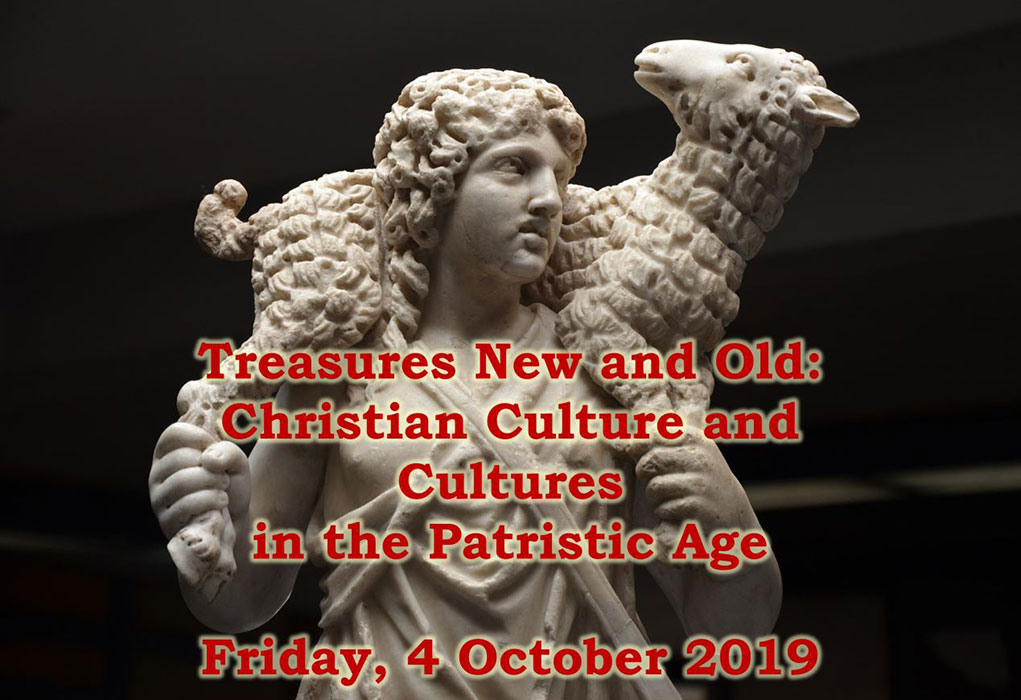
The Center thanks all those who participated in the conference Treasures New and Old: Christian Culture and Cultures in the Patristic Age. President John Garvey's comments can be found here. Prof. Robert Wilken's remarks appear in the February 2020 issue of First Things under the title "An Affair of Things". Photos of the conference can be found here. Below is an archived copy of the Conference Description and Program.
Conference Description
The earliest followers of Jesus lived in cities and regions in which religion and culture were tightly interconnected, both to one another and to the state. Yet even as they grew in number and stood apart from their neighbors in religious belief and practice, Christians of the first and second century claimed hardly any distinctive culture of their own. They lived in a variety of cities and villages, and spoke a variety of languages. They practiced no particular trade or manner of life, had differing levels and types of education, and wore no special kind of clothing (Epistle to Diognetus 5.1-4).
The first Christians did of course share some things in common, including core beliefs, inspired Scriptures, oral traditions, a developing hierarchy, ritual practices, and demanding ethical standards. But without art, architecture, music, or very much in the way of theological or philosophical writings, poetry, or other literature, this was not the same as a fully developed Christian culture, of the sort that could match the complex elite and popular cultures with which they were surrounded.
Making such a culture (or rather, cultures, since they varied significantly from one locale to another) was the work of the period that followed. This period is often called the Patristic Age, named for the Church fathers whose writings defined it. During these centuries, many existing cultural features, often of great antiquity, were assimilated into a new Christian framework, sometimes unchanged and sometimes in adapted form. In time, cultural features that could not be re-used were rejected or very much minimized, and when necessary completely novel institutions and practices were added. In this way, enduring cultural forms took root, in many cases so well that they long outlasted the Roman and Persian imperial settings in which early Christianity developed; many continue to the present.
This one-day conference aims to survey some of the ways in which a Christian culture and Christian cultures were created in the second through seventh centuries AD. It will not neglect the problems, contradictions, and resistance that these encountered, but will lay special emphasis on the cultural results that endured and the reasons (political, theological, aesthetic) why this may have occurred. The conference will focus on regions both east and west of Jerusalem and north and south of the Mediterranean Sea. It will consider texts written in the main early Christian languages (Greek, Syriac, Latin, Coptic), as well as the material culture of these regions (churches, places, objects). It will feature papers given by faculty, alumni, and students from the Catholic University of America, and will explore themes such as asceticism and monasticism, Christian poetry and education, church and state, liturgy and music, biblical interpretation, and Christian art and architecture.
The conference will be open to the Catholic University community and invited members of the general public. All presentations will be designed to appeal to a broad audience, with no specialized knowledge required.
Conference Program
|
10:00 a.m. |
Opening Mass (Caldwell Chapel) |
|
11:00 a.m. |
Conference Welcome (Heritage Hall) Provost Aaron Dominguez |
|
11:15–11:45 a.m. |
Paper Session I (Heritage Hall) Presider: Dr. Nora Heimann, Chair, Department of Art Abraham and Christian Identity Yuliya Minets (University of Notre Dame) “The Primordial Language in Early Christianity and Judaism” |
|
11:45 a.m.–1:00 p.m. |
Buffet Luncheon (Heritage Hall) President John Garvey Prof. Robert Wilken (Emeritus, University of Virginia) |
|
1:00-1:30 p.m. |
Paper Session II (Heritage Hall) Presider: Dr. Chad Pecknold, School of Theology and Religious Studies Unity and Concord in the Early Church Joshua Kinlaw (The King's College) “The Concord Rhetoric of Clement of Rome” |
|
1:30-2:00 p.m. |
Virtue and the Roman State |
|
2:00-2:15 p.m. |
Coffee Break |
|
2:15-2:45 p.m. |
Paper Session III Presider: Dr. Kevin White, School of Philosophy Pagan and Christian Poetry |
|
2:45-3:15 p.m. |
The Theology and Art of Christian Rhetoric |
|
3:15–3:45 p.m. |
Christian Literature and the Legacy of Philosophy |
|
3:45-4:00 p.m. |
Coffee Break |
|
4:00-4:30 p.m. |
Paper Session IV (Heritage Hall) Presider: Sr. Maria Theotokos Adams, SSVM, School of Theology and Religious Studies Early Christian Kings and Kingship |
|
4:30-5:15 p.m. |
Science in Early Christianity Karen Carducci (The Catholic University of America) "Mountains of Rome" |
|
5:15-5:30 p.m. |
Coffee Break |
|
5:30-6:30 p.m. |
Paper Session V Presider: Dr. Lionel Yaceczko, The Heights School The Material Culture of Early Christianity |
|
6:30 p.m. |
Exhibition of Early Christian Artifacts (May Gallery) Reception |
Conference Photos
